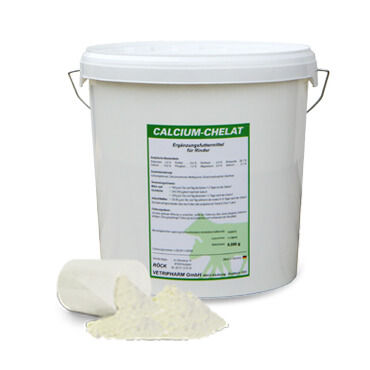
CALCIUM-CHELAT
Complementary feed for bovines
The effective Calcium-Booster
CALCIUM-CHELAT- along with the prompt and safe transfer of available calcium, Calcium-Chelat conducts to the organism biological, high-quality amino acids and energy carriers - the best foundation for vigorously healthy animals.
| 5 kg | Bucket | Powder |
| 25 kg | Bucket | Powder |
Produktdetails
Application
Analytical constituents
Composition
Instructions for proper use
General findings of nutritional science
Application
CALCIUM-CHELAT is a complementary feed for bovines. It conducts to the organism besides prompt and safe transfer of available calcium, biological, high-quality amino acids and energy carriers, which are the best foundation for healthy and lively animals. Only by the balanced interplay of prompt and safe reabsorbant calcium, biological high-quality amino acids and energy carriers, can a solid basic supply of essential active agents be offered to animals. The consequent optimization of metabolism ensures cattle have the best provender to allow their giving birth without problems, having a maximum milk yield, guaranteeing sustained body volume, strong bones and joints, as well as ensuring continued fertility. In the case of calves, the drinking trough achieves a higher value, but no extra milk is required. Thus, accelerated increase in weight can be seen, and there is less proneness to diseases.
Analytical constituents
| Crude protein | 2,0 % | |
| Crude fat | 0,4 % | |
| Crude fibre | 0,4 % | |
| Crude ash | 39,1 % | |
| Calcium | 14,0 % | |
| Magnesium | 0,5 % | |
| Phosphorus | 1,5 % | |
| Sodium | 0,1 % |
Composition
Calcium gluconate, calcium carbonate, whey powder, dicalcium phosphate, dextrose
Instructions for proper use
Dairy cows for milk production and cows for reproduction:
100 g per animal per day the last 1-2 days before birth
200-300 g immediately after birth
100 g per animal per day the first 1-2 days after birth
Calves for rearing:
25-50 g per animal per day during the first 8-10 days after birth
The CALCIUM-CHELAT is given with the feed or it can be dissolved in a beverage.
General findings of nutritional science
Calcium plays an important part in energy metabolism and in functional capability of the musculature. In the case of calcium deficiency, not only the muscle cells of the locomotor system and the heart react, but also the digestive system, the udder and the uterus suffer a drastic functional loss.
With cattle such a loss of muscular and metabolic function can cause lactic fever shortly before and during birth, and up to 72 hours after it. During this time, milk production starts abruptly, and leads to a substantial increase in calcium demand because the supply of endogenous calcium is no longer enough. Calcium value in the blood distinctly drops and this leads to the typical symptoms of lack of appetite, digestion disorders, weakened movement (ataxia); all of which can cause inability to stand, induce heart and circulatory problems (cold body surface, cold legs), mastitis, and decreased milk production, as well as occasioning delayed birth and problems with the after-birth.
If the symptoms of milk fever are strongly pronounced, a calcium infusion by a veterinarian is the only choice. Much more sensible - and cheaper - would be a prophylactic administration of calcium before decrease in the blood's calcium content, especially for patients at dire risk (animals which have already had milk fever, older animals or animals with a high milk yield). The threat of calcium deficiency and the incidence of milk fever are thereby markedly reduced.
To maintain the blood's constant calcium level, the supply of a quick and safe reabsorbant calcium formulation is necessary. This demand can be fulfilled especially by calcium in gluconate-form, for such calcium is united in organic form. This activates intake from the intestine and ensures immediate transfer to the required location.
Furthermore, calcium is important for the development, capacity and strength of bones and joints. If the higher demand for calcium is not sufficiently satisfied for cattle, especially during the time of growth, pregnancy and lactation, it will lead to stiffness, bone swelling, inflammation, weak joints and even to bone fractures in the limbs. Calves especially have a very high demand for mineral substances as their growth is very rapid. Calcium deficiency can lead to irreparable deformations of the limbs and consequently to the loss of animals.
Dextrose plays a key role in the entire energy metabolism. By quick intake from the intestine, it is immediately available to remedy possible energy deficiencies or to enable the formation of body substance. The activity of the micro-organism in the forestomachs is encouraged by the dextrose supply, and thereby feed utilization intensifies. Additionally dextrose increases the milk yield as the dry matter and the protein of the milk is bound to adequate dextrose supply.
For calves, an adequate and balanced supply of biological high-quality amino acids encourages the endogenous power of resistance and the building of musculature (meat line), the bones and of the organs. This leads to distinctly better stress resistance and therefore to a lower disease and death rate. With fully grown cattle, amino acids increase the milk yield, improve the anabolic process (construction and maintenance of body volume) and support the organism to rectify the damage of protein deficiency and metabolic disorders. The lessening of endogenous protein synthesis in older animals is delayed. As feed rations with their conventional amount of biological, high-quality amino acids are often not enough, an additional supply of amino acids is indispensable.



